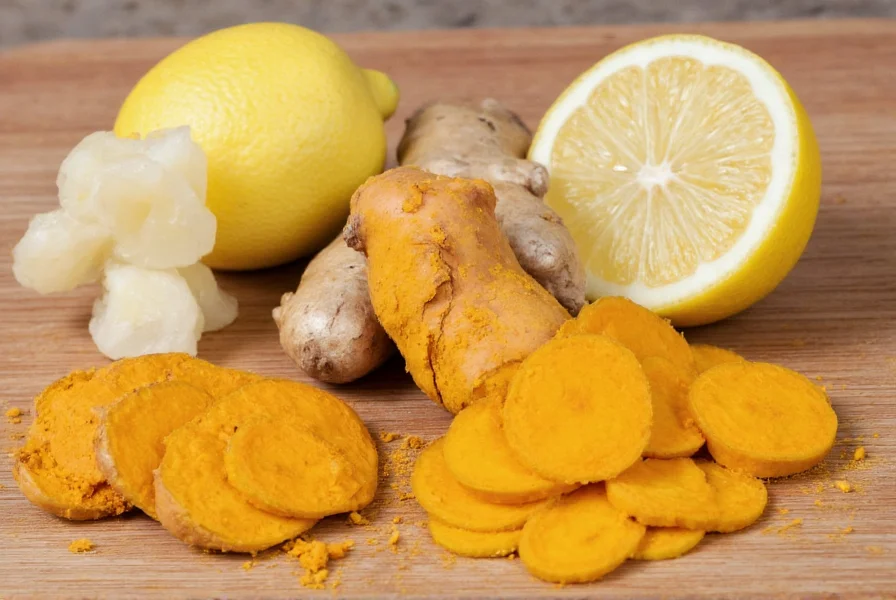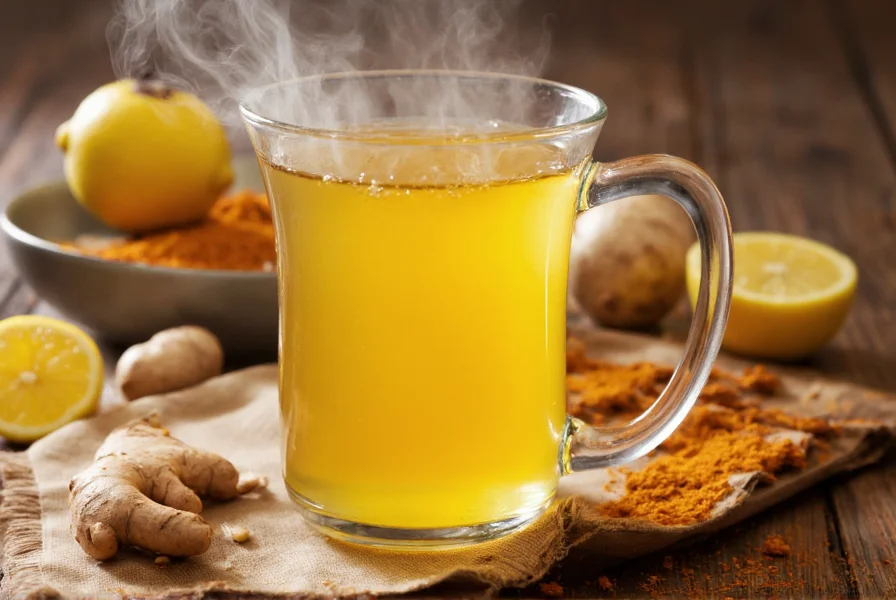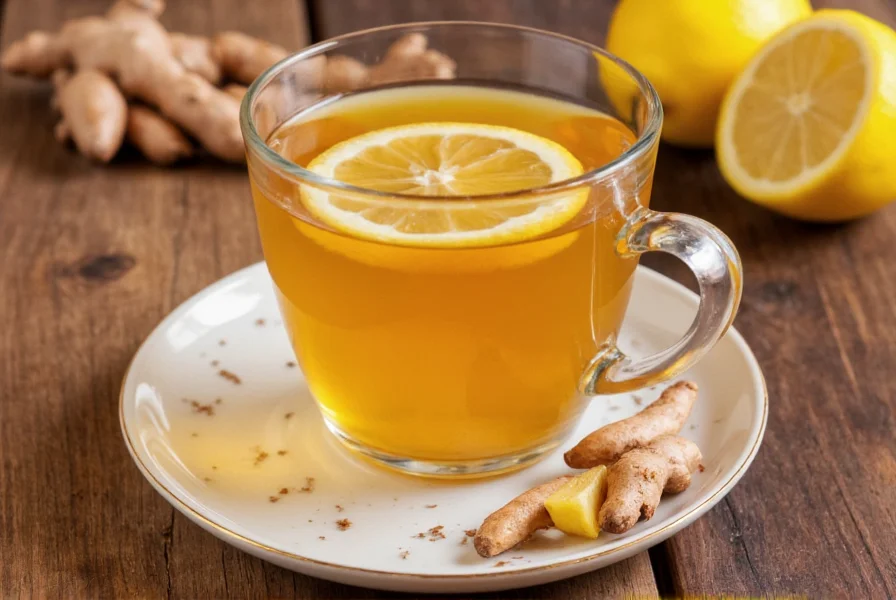For health-conscious individuals seeking natural wellness solutions, turmeric lemon ginger tea has emerged as a popular daily ritual. This golden-hued beverage combines three powerhouse ingredients with deep roots in traditional medicine systems worldwide. Unlike many trendy health drinks, this combination has growing scientific support for its potential benefits, though it's crucial to understand both what the research shows and its limitations.
The Science Behind the Ingredients
Each component of turmeric lemon ginger tea contributes unique bioactive compounds that work synergistically:
Turmeric: The Golden Root
Turmeric contains curcumin, its primary active compound responsible for the vibrant yellow color and most health benefits. Research published in Advances in Experimental Medicine and Biology indicates curcumin has potent anti-inflammatory and antioxidant effects. However, curcumin has notoriously poor bioavailability on its own. This is why traditional preparations often include black pepper (containing piperine) which can increase curcumin absorption by up to 2,000% according to a Planta Medica study.

Ginger: Nature's Digestive Aid
Ginger contains gingerols and shogaols, compounds with demonstrated anti-nausea and anti-inflammatory properties. A systematic review in Nutrition Journal found ginger effective for reducing muscle pain and soreness. For digestive health, research in Molecular Nutrition & Food Research shows ginger accelerates gastric emptying, which explains why many people find relief from bloating after consuming ginger tea.
Lemon: The Bioavailability Booster
Lemon contributes more than just flavor to this blend. The vitamin C and citric acid in lemon enhance the absorption of curcumin while providing their own antioxidant benefits. Additionally, lemon's acidity helps preserve the active compounds in both turmeric and ginger during preparation.
Evidence-Based Health Benefits of Turmeric Lemon Ginger Tea
While traditional medicine has used these ingredients for centuries, modern research helps clarify which benefits have scientific backing:
| Benefit Category | Scientific Support Level | Key Research Findings |
|---|---|---|
| Anti-inflammatory effects | Strong | Multiple studies show significant reduction in inflammatory markers like CRP |
| Digestive support | Moderate to Strong | Ginger accelerates gastric emptying; turmeric may reduce IBS symptoms |
| Immune function | Moderate | Vitamin C supports immune cells; curcumin modulates immune response |
| Pain relief | Moderate | Ginger effective for menstrual pain; turmeric shows promise for arthritis |
| Antioxidant capacity | Strong | High ORAC values demonstrate significant free radical scavenging ability |
How to Prepare Turmeric Lemon Ginger Tea for Maximum Benefits
The preparation method significantly impacts the health benefits you'll receive from turmeric lemon ginger tea. Here's an evidence-based recipe that maximizes bioavailability:
Optimal Turmeric Lemon Ginger Tea Recipe
- 1 cup (240ml) filtered water, brought to a gentle simmer
- 1/2 inch fresh turmeric root, grated (or 1/4 tsp turmeric powder)
- 1/2 inch fresh ginger root, sliced thin
- 1/4 lemon, freshly squeezed
- Pinch of black pepper (essential for curcumin absorption)
- Optional: 1/2 tsp coconut oil or olive oil (fat helps absorb curcumin)
Simmer turmeric and ginger in water for 10-15 minutes. Remove from heat, add lemon juice and black pepper. Adding a small amount of healthy fat significantly increases curcumin absorption. Avoid boiling the lemon juice as high heat can degrade vitamin C.

Important Considerations and Potential Side Effects
While turmeric lemon ginger tea is generally safe for most people, certain considerations should be noted:
Who Should Exercise Caution
- Individuals taking blood thinners (turmeric has mild anticoagulant properties)
- People with gallbladder issues (turmeric may increase bile production)
- Those with gastroesophageal reflux disease (GERD) may experience heartburn
- Pregnant women should consult their healthcare provider about ginger consumption
The appropriate daily amount of turmeric lemon ginger tea varies by individual. Most research on turmeric uses 500-2,000 mg of curcumin daily, which would require approximately 1-3 cups of properly prepared tea. Consuming excessive amounts may cause digestive discomfort.
Realistic Expectations: What Turmeric Tea Can and Cannot Do
It's important to maintain realistic expectations about turmeric lemon ginger tea benefits. This beverage is not a cure-all miracle drink, but rather a supportive component of a healthy lifestyle. The anti-inflammatory effects are generally subtle and build over time with consistent consumption. Unlike pharmaceutical medications, the effects are gentle and cumulative.
For those wondering does turmeric ginger tea help with inflammation, the answer is yes—but with caveats. Research shows modest reductions in inflammatory markers, particularly with regular consumption over weeks or months. It works best as part of an anti-inflammatory diet rather than as a standalone solution.
When to Drink Turmeric Lemon Ginger Tea
The best time to drink turmeric lemon ginger tea depends on your goals:
- Morning: Supports digestion throughout the day and provides gentle immune support
- Before meals: May enhance digestion and nutrient absorption
- Evening: Can be soothing before bed, though those sensitive to ginger may prefer morning consumption
Many people find that consuming turmeric lemon ginger tea consistently for 4-6 weeks yields the most noticeable benefits for inflammation and digestion. The key is regular, sustained consumption rather than occasional drinking.
What are the primary health benefits of turmeric lemon ginger tea?
The primary evidence-backed benefits include anti-inflammatory effects, digestive support, and immune system enhancement. Turmeric provides curcumin with potent anti-inflammatory properties, ginger aids digestion and reduces nausea, while lemon boosts curcumin absorption and provides vitamin C. Regular consumption may help reduce inflammatory markers, improve digestion, and support overall wellness when combined with a healthy lifestyle.
How often should I drink turmeric lemon ginger tea to see benefits?
For noticeable benefits, most research suggests consuming turmeric lemon ginger tea 1-3 times daily for at least 4-6 weeks. The anti-inflammatory effects build gradually with consistent consumption. One cup in the morning and another before dinner provides sustained benefits throughout the day while maximizing curcumin absorption when paired with healthy fats.
Why is black pepper important in turmeric tea recipes?
Black pepper contains piperine, which significantly increases curcumin absorption from turmeric. Scientific studies show piperine can enhance curcumin bioavailability by up to 2,000%. Without black pepper (or another absorption enhancer), most of the curcumin passes through the digestive system unabsorbed, dramatically reducing the tea's potential health benefits.
Can turmeric lemon ginger tea interact with medications?
Yes, turmeric has mild blood-thinning properties and may interact with anticoagulant medications like warfarin. Ginger can also affect blood pressure medications. If you take prescription medications, particularly blood thinners, diabetes medications, or blood pressure drugs, consult your healthcare provider before regularly consuming turmeric lemon ginger tea to avoid potential interactions.
What's the best way to prepare turmeric tea for maximum health benefits?
For maximum benefits, simmer fresh turmeric and ginger in water for 10-15 minutes, then add freshly squeezed lemon juice and a pinch of black pepper off-heat. Including a small amount of healthy fat like coconut oil significantly increases curcumin absorption. Avoid boiling the lemon juice as high heat degrades vitamin C. Using fresh ingredients rather than powders provides more active compounds and better flavor.











 浙公网安备
33010002000092号
浙公网安备
33010002000092号 浙B2-20120091-4
浙B2-20120091-4